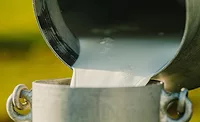Montana House OKs Raw Milk Bill
A bill allowing small farms to sell raw, unpasteurized milk directly to consumers has been approved by a Montana House committee, sending it to the full House for debate. The House Agriculture Committee voted 16–1 Thursday night to advance House Bill 574, but not before amending it to remove requirements for state testing of the milk at the farms selling it. Instead, the milk will have to carry a warning label that says “This product contains unpasteurized milk, also known as raw milk.”
The panel also amended the measure to say anyone consuming raw milk “assumes inherent risks” and is legally responsible for any harm they may incur, and that it’s not the duty of the state to protect against those risks.
Chris Rosenau of Stevensville, a supporter who drafted the bill, said Friday she’s concerned that removing the testing provision could undermine support for the bill in the full House.
But the bill’s sponsor, Rep. Champ Edmunds, R-Missoula, said he’s not worried.
“It’s got pretty broad-based bipartisan support,” he said. “I suppose it could lose a few votes (because of the no-testing provision), but I still expect it to pass.” Edmunds said the testing was removed from the bill to alleviate any concern about the cost, which could sink the bill. “In an effort to kill it, (the department) put this enormous fiscal note on it,” Edmunds said. “So instead of testing, we decided to do a warning label.”
Current state law forbids the sale of unpasteurized milk in Montana, although those producing raw milk on their farms can drink it themselves.
The bill would allow dairy herds of less than 15 producing cows, 30 goats or 30 sheep to sell raw milk directly to consumers.
At a hearing on the bill 2 weeks ago, many small farmers testified that raw milk is safe and that allowing its sale directly to consumers can help those farms bring in some extra money.
However, state livestock, milk industry and public health officials strongly opposed the measure, saying that unpasteurized milk can cause food-borne illnesses, and that an outbreak in Montana would hurt the industry.
The original version of the bill required periodic health testing of the exempt farms’ milk and milk products. A fiscal note prepared by the Department of Livestock said the testing would cost an additional $278,000 a year. Rosenau and other supporters said that estimate is far too high, and that the cost should be only a few thousand dollars a year.
Steve Merritt, spokesman for the Department of Livestock, said Friday the agency hasn’t examined the amendments, and would have no immediate comment on the new version of the bill.
Looking for quick answers on food safety topics?
Try Ask FSM, our new smart AI search tool.
Ask FSM →






